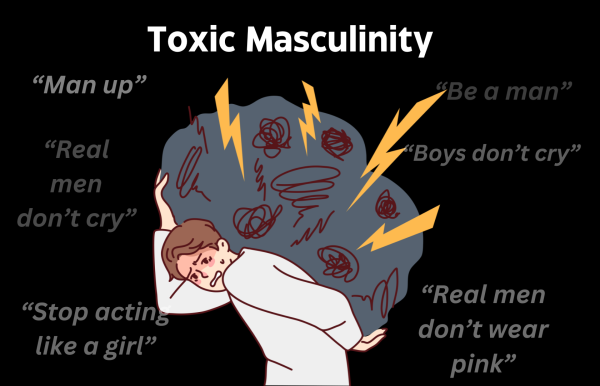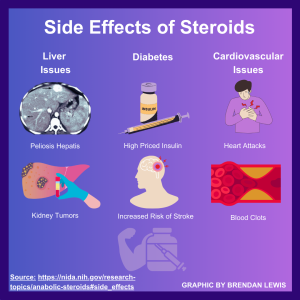
“Man up,” “don’t wear that” and “pink is for girls” are all terms boys have heard growing up. Despite cultural progress, males unfortunately still feel confined by toxic masculinity, which according to Anxiety & Depression Association of America (ADAA), is defined as the traditional standards of behavior men must meet in society.
For example, many males feel they need to be able to handle difficult tasks all on their own and never cry in public. According to the ADAA, traits of toxic masculinity include toughness, such as refraining from showing emotion, pursuing physical strength and displaying aggressiveness, as well as rejecting domestic tasks and help.
According to the ADAA, suppression of emotions can cause an increased feeling of shame when having “nurturing” feelings, such as love, comfort and others. The only acceptable sentiments become anger and rage. The suppression of emotions can also encourage isolation from fellow peers.
Students and young boys are often bullied for not perfectly conforming to physical strength standards and appearance, which teaches them that strength and appearance are equated to their worth as a human being. This creates a mindset where their physical attributes will determine whether they achieve success in life- a faulty and misguiding lesson.
If toxic masculinity’s impact on youth was lessened, teenagers would feel more comfortable to be their true selves without shame. Modeling empathy and more emotions in healthy ways can give males space to feel emotions and develop empathy for others.
Toxic masculinity dictates standards on strength and beauty. According to Libera Universita Internazionale Delgi Studi Sociali, traditional masculinity pushes high body standards upon young men, stating that the “aesthetic body” and “physical attractiveness” are both associated with traditional masculinity. This is shown when male fitness influencers lie about their status as a “natty,” someone who has never taken appearance/performance enhancing drugs (APEDs). Take Youtuber Dylan McKnight as an example. He is a youtuber/fitness influencer that lied about taking steroids, burdening teenage boys with naturally unattainable body goals.

In the chase to meet male beauty standards, some men are driven to use APEDs, encouraged by uncertified fitness influencers without understanding the consequences of them. For example, it is common in fitness social media communities to see videos of unnaturally muscular men working out with captions giving bad or harmful health advice. According to the National Institute on Drug Abuse, steroids and APEDs in general have a variety of negative health effects, including high blood pressure and hepatis peliosis, a condition where sporadic blood filled cavities appear throughout the liver.
In addition, toxic masculinity can isolate men by forcing upon them the ideal that asking for help makes them “weak” and “girly,” and the only option is self-reliance. According to the American Journal of Men’s health, constant self-reliance is correlated to lower levels of communicative health literacy, the ability to discuss health topics with health providers.
Fortunately, it is far healthier for males to admit their flaws and imperfections and receive help and support, according to . By doing this, males relieve unnecessary, unwanted stress and pressure on themselves, giving space to help and support others in ways that they feel comfortable and happy doing. A more healthy masculinity, which all men deserve.








